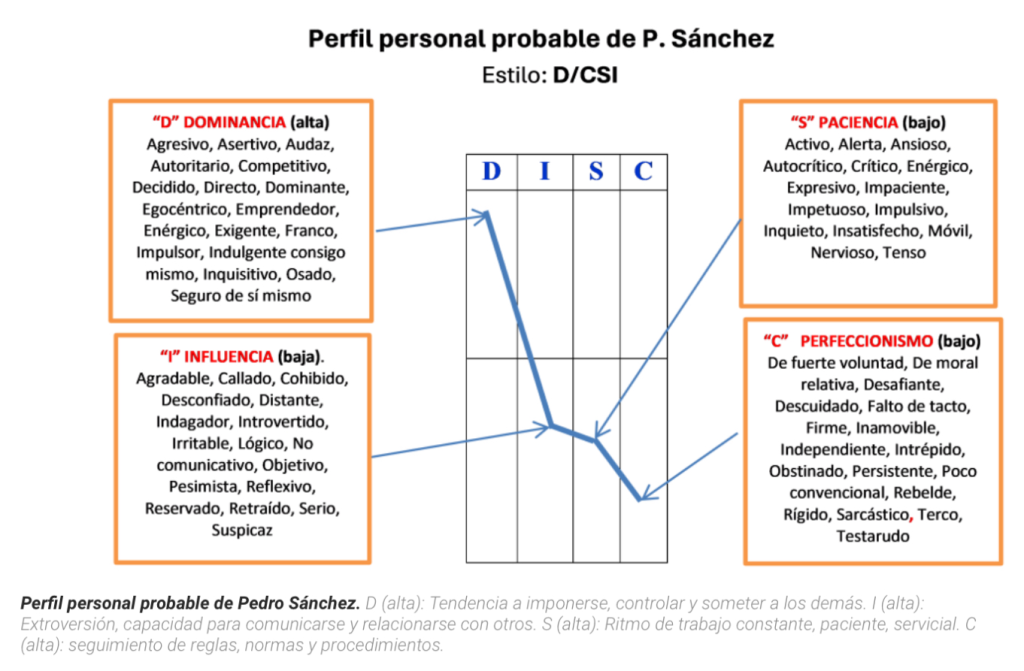VÍCTOR PÉREZ VELASCO
THE PROBABLE PERSONAL PROFILE OF PEDRO SÁNCHEZ, PRESIDENT OF THE SPANISH GOVERNMENT

It is a common practice that political leaders, allies or enemies, special subjects, public figures, etc., are the subject of study and objective analysis of their personal profile, in order to understand, predict, improve and even neutralize their behavior, or simply to biographize them. All this despite the fact that these people are not accessible to scholars who wish to know their personal traits. The more rigor and the less distortion, the more valuable this analysis will be.
In these cases, the study is carried out by indirect observation, without the application of psycho-technical tests, resorting to public documentary analysis, videos, statements and information about the character, which the subject himself is spreading about himself, consciously or unconsciously. The role of the observer will be to collect, analyze and synthesize, until a probable and rigorous profile of the character in question is built. This is the case that will be addressed below.
Well, using the DISC four-trait personal analysis model (Dr. Moulton Marston), combined with the public information that Pedro Sánchez has projected through his public exposure as a politician for more than five years, it has been possible to design this personal profile. Obviously, neither his intelligence nor other psychological capacities are evaluated.

From the above graph it is possible to deduce the basic core of his personality, a cumulative summary of the more than thirty descriptors recorded in the four factors (D/CSI), which define him as a pure dominant person.
Among these psychological descriptors, the following can be highlighted as the most likely to apply: this person is likely to be determined, assertive, direct, energetic, goal-oriented, aggressive, demanding, winning and very tenacious. These traits make him/her respond to a winning profile, being able to capture an important number of voters. She also stands out for her ability to protect her followers from fear, especially within her affinity group.
Our character may be very good at “managing things”, but on the other hand, he does not seem to be very good at managing emotions or people. He will probably have a rather limited emotional intelligence. We do not detect a special potential as an influencing subject, hence he resorts to “negotiate” or “buy” wills, and even to imposition, a typical trait of dominants. From another perspective, his low adherence to norms and rules makes him dispense with them as soon as they pose obstacles and he has no qualms about skipping backgrounds, regulations and procedures, the main characteristic of democratic societies.
We provide ten additional traits of this politician, detached from his overall profile:
Autocratic. The first capacity that a very dominant person develops and applies is the tendency to hoard and concentrate the power he can accumulate, wherever it is located, in this case the State. It is a spontaneous way for a dominant to assert his identity and prepare to achieve his ends. In a democratic society the division of powers will limit his ambitions, but he will, if he can, overflow them.
Ambitious. It is the main motivator of very dominant people, to achieve power and win, to achieve results no matter what. The passion to win of these subjects is welcome for certain human activities developed in healthy competition, but it becomes a real nightmare when the subject acts without limits of rules or norms, as in this particular case.
Cynical. Since he is forced to seduce those who can help him to succeed, using stratagems based on half-truths and, if necessary, he proceeds to buy wills. So he presents different faces depending on the objectives, hiding his real intentions. This is possible thanks to his moral relativism, since his modus operandi assumes that something is ethical if it helps him to achieve his goals. The political cynicism of this ruler is transmuting into institutional felony against the State he is supposed to defend.
Impulsive. Logical consequence of his energetic character typical of the dominant. This leads him to develop the actions he prioritizes, in a compulsive and accelerated manner, a rhythm that sometimes collides with the regulated times that apply to complex legislative decisions in democracy. Hence his abuse of decree laws and emergency procedures, disregarding regulations and degrading the procedures in use. In this way, it intends to overwhelm dissenters and gain time for its objectives. The end result is the degradation of the quality of our democracy.
Threatening. Since his motivator is to win and his fear is to lose, he is prone to unleash criticism, changes (purges) and dismissals among collaborators who do not live up to his demands or are an obstacle to his achievements. Such dominant people are very direct and have difficulty controlling their emotions when they are rebuffed or feel frustrated at not achieving their objectives. Surprisingly, as President of the Government, he goes so far as to make threats in public to his political adversaries.
Intolerant. This makes him phobic and destructive of what he does not share. For this reason, he lives in constant degradation of the common culture that unites Spaniards, for example, our History, our lingua franca, our majority religion, our traditions and even the family, as a model of coexistence. Instead, it enhances what weakens us, reviving any form of nationalism or dissident localism.
Psychopathic. This psychological characteristic is considered neither a pathology nor a clinical anomaly, it is simply one more trait of a personality that does not develop emotions of guilt derived from its actions, nor empathic behaviors towards the people with whom it relates. Let us think of his poor emotional intelligence. This trait becomes a variable that together with some of those we have seen above, allows him to act without scruples or moral or legal limiters.
Anomic. Because chained with the previous trait and synergistic with other characteristics of his personality already commented, our character seems to suffer from social anomie. That is to say, the calculated ignorance (situational, of those laws, regulations and norms that, for his own tactical convenience, he does not recognize or avoids. For example, our Constitution. He acts as if it did not exist or worse, he does not submit to it, he degrades it, so that for this politician “red lines” do not really exist).
Enigmatic visionary. Because he maskedly serves his personal objectives rather than the institutional ones. Characteristic of the high D (dominant), that when they act, they do it at the service of a vision, which they will hide or make explicit at their convenience. It has as a strong point strategic thinking and long term planning, more easily than other personality types. Conclusion, no one knows exactly what this character has in store for the future, which is all the more reason to be questioned as a public official if he does not act with transparency.
As a leader, his style is authoritarian, not very participative, doubtfully democratic, oriented to win and little delegator, typical of autocrats. In addition, the set of traits described in previous paragraphs, allow us to add one more trait to his profile: being a manipulative leader.
Apart from this specific case, these types of leaders are quite common in public and private organizations. They are especially prevalent in expansion projects, crisis situations, and where the important thing is to survive or grow at any cost. The problem with these leaders is that, although successful, they tend to “burn out” their own teams due to the emotional costs they bear under their orders, subjected to constant arbitrariness and pressure. This style of leader, despite their successes, can be dysfunctional for the interests of the organization itself.
Obviously, in this analysis we refrain from evaluating his personal values and his socialist and progressive political ideology, because we are dealing with a psychological study of the person, not of his ideas, beliefs or doctrine.
From another point of view, we will emphasize that, in this person, neither clinical nor psychopathological traits are observed, but his profile follows a psychological normality, although derived from accentuated dominance traits (high D) and absence of respect for rules and norms (low C).
Finally, our character too often confuses the “vigor” of his personal energy with the “rigor” in the knowledge of rules, functions and tasks required to successfully execute his public office. He is vigorous, but not rigorous. That is why this type of politician is often feared, because they become explosive bombs of delayed effect, consequence of a destructive mixture: being overbearing, not being rigorous and also having the power and initiative to change things in their own way.
————
VÍCTOR PÉREZ VELASCO is a psychopolitologist, writer and founder of Thomas International Spain.
This article was originally published in Escudo Digital. If you use it, please cite the author and Escudo digital.



